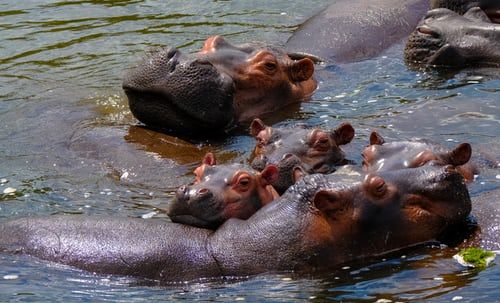Colombian drug lord Pablo Escobar continues to influence the South American nation from beyond the grave, with the hippopotamuses he had brought to his private zoo starting to pose serious threats to environment and human safety.
Escobar, who was gunned down in 1993, imported one male and three female hippos to his ranch Hacienda Napoles, located around 160 kilometres east from the city of Medellin, CNN reported.
Also Read | Colombia sets new record in eradicating cocaine production
While the other exotic animals at the zoo were relocated, the hippos were left behind because of their size and the resultant difficulty in transporting them. They have since gone on to breed successfully and have raised concerns over their impact on the environment, researchers at Mexican and Colombian universities have found.
With their population steadily rising, the hippos have spread all over the Antioquia department and around the Magdalena river basin. And in order to prevent any long-term negative effects, the researchers, whose study was published in the January edition of the journal Biological Conservation, have recommended culling the animals.
However, concerns over animal welfare and a rising attachment of the local population with the hippos have caused a number of scientists to call for a castration program to curb their numbers.
Previous culling efforts by the government were called off after a public outcry. Instead, a sterilisation campaign was launched, but it has yielded meagre results.
Also Read | Deforestation wiped out 8% of Amazon in 18 years: Study
Four male were castrated and two female hippos were sterilised between 2011 to 2019, although, it did “not seem to have an important impact on reproduction,” the study said.
Researchers estimate a hippo population of over 80 in the area today, rising from 35 in 2012, and have warned of their continual spread throughout Colombia if not acted upon.
Research shows negative effects of hippo waste on the oxygen levels in water bodies, which can affect fish and humans in the long run, and also raising concerns of transmission of diseases from hippos to humans.
“Right now, the authorities don’t consider the species to be a problem,” Enrique Zerda Ordóñez, a biologist at Colombia’s National University, said.
“But in the future, when there are 400-500 hippos, it could represent a threat to the survival of other species that feed in the same areas.”
Meanwhile, David Echeverri Lopez, head of forests and biodiversity at the CORNARE regional environmental agency, told CNN that hippos are a naturally invasive species, and are capable of altering the local ecosystem. However, local people have got used to the hippos, which have also become a tourist attraction, he added.







